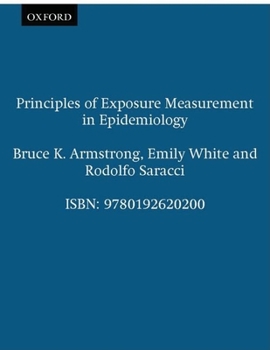Principles of Exposure Measurement in Epidemiology
Select Format
Select Condition 
Book Overview
Most of the research in epidemiology attempts to relate exposure to external agents to the occurrence of particular diseases. However, this research depends critically on accurate measurement of exposure. Armstrong's work assimilates, in a single source, the principles and techniques of exposure measurement as they relate specifically to causes of non-infectious diseases. It draws on experience and results from many different disciplines (including psychology, survey research, sociology, environmental hygiene, epidemiology, and biostatistics) and synthesizes them for direct practical application in epidemiological and related research. In addition, the volume covers questionnaire design, conducting personal interviews, abstracting information from medical records, use of proxy respondents, and use of biological and environmental measurements. It gives a comprehensive account of measurement effects, and the design, analysis, and interpretation of validity and reliability studies. Emphasis is given to the methods by which the validity of measurements can be increased. Techniques to maximize participation of subjects in epidemiological studies are discussed, and ethical issues relevant to exposure measurement are outlined. The book will be useful as a handbook for anyone wishing to design or conduct an epidemiological study and can also be used as a graduate text for an exposure measurement in epidemiology course.
Format:Paperback
Language:English
ISBN:0192620207
ISBN13:9780192620200
Release Date:December 1994
Publisher:Oxford University Press, USA
Length:368 Pages
Weight:1.38 lbs.
Dimensions:0.8" x 6.3" x 9.2"
Customer Reviews
0 rating





